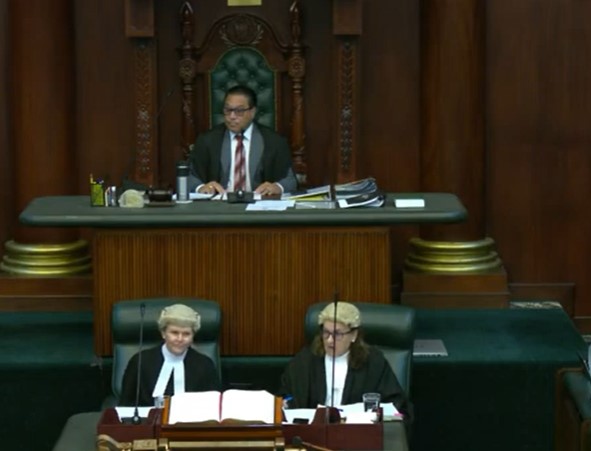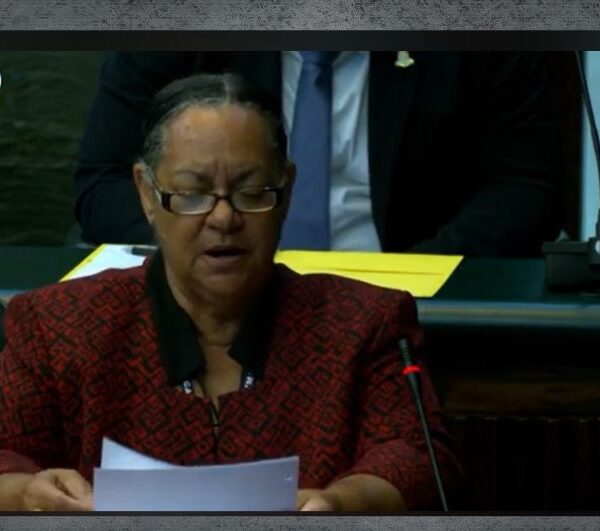
Speaker of Parliament
|
Getting your Trinity Audio player ready...
|
By Alric Lindsay
In the third sitting of the fourth meeting of the 2023-24 session of Parliament on July 24, 2024, the Speaker of Parliament, the Hon. Sir Alden McLaughlin, KCMG, MBE, KC, JP, MP, highlighted that the Parliament had “not yet agreed a code of conduct which all members may subscribe to or would be required to subscribe to.” The Speaker emphasized that it is important to get this done and that it should be underpinned by “the force of law” and not just implemented as a “voluntary code” as previously presented to members of the Parliament.
Issues with the draft Parliamentary Code Of Conduct
Regarding the status of the Parliamentary Code of Conduct, MP McKeeva Bush told the Speaker that he thought a code of conduct had been signed; however, the Opposition did not execute it because it did not agree to its terms.
The Speaker confirmed that Bush’s position was correct, adding that “The government members at the time signed a code of conduct voluntarily,” however, “The terms of it were not acceptable to the Opposition” for several reasons, one of which was that there was no independent party designated to “deal with complaints and make and give judgment on them.”
The answers from Mr Bush and the Speaker are consistent with a previous statement made by the Leader of the Progressives, Roy McTaggart, in which he raised concerns about the voluntary Parliamentary Code of Conduct. Reportedly, these concerns were communicated to the Premier at that time.
Concerning McTaggart’s previous statement, this read as follows:
Today, I have written to Premier Panton to advise that his proposed Parliamentary Code of Conduct falls short in two important respects. First, there are significant failures in process that violate the principles of good governance that the Premier claimed would characterise his government.
Secondly, and more significantly in the long run, there are significant failures of substance which mean that the proposed Code would be ineffective and inappropriate. It fails the basic test that such a Code should both ensure that Parliamentarians are properly held to account for their conduct and also guarantee an impartial process through which that accountability should be achieved.
Therefore, I advised the Premier that neither I nor any of my colleagues in the Opposition will sign the Code as currently drafted.
McTaggart added:
I would also note that a Parliamentary Code of Conduct must also be a permanent part of the architecture which governs the conduct of the House and Parliamentarians. It should formally be adopted by a Resolution of Parliament and bind future members of Parliament. Of course, like the Standing Orders, it could be amended by further Resolutions of Parliament.
I have urged the Premier to utilise the Constitution Commission’s guidance on what a Code of Conduct for Parliament should contain and consider using a body such as the Commission for Standards in Public Life as the independent investigator.
Regarding the appointment of an independent investigator mentioned by McTaggart, the Speaker noted that he was “being told through the auspices of the Honorable Attorney General Office [that the issue] is close to being resolved with the Standards in Public Life Commission having agreed to assume that role.”
With another party reportedly agreeing to act as an independent investigator, the only outstanding issue appears to be giving the Parliamentary Code of Conduct the force of law.
While the Speaker did not discuss how this could be done, there are two common options: amending the constitution to include the Parliamentary Code of Conduct or passing new legislation.
Including the Parliamentary Code of Conduct in the constitution would appear to have the strongest impact as the constitution is to be respected as the highest document in the country. Consequences for breaches of the Parliamentary Code of Conduct in the constitution could include the MP’s removal from any post as minister and dismissal from Parliament, after which a by-election could be held to replace the MP.
Implementing the Parliamentary Code of Conduct in legislation may also work, with accompanying fines for breaches. However, the issue is that the Legislature (which includes MPs) could amend legislation at any time to suit MPs’ interests.
From a governance standpoint, this must be done properly and effectively as suggested above. If not, MPs may argue in the future that the Parliamentary Code of Conduct is just a guide and has no constitutional or legislative force. In such a case, MPs are unlikely to be held accountable or face any consequences.







